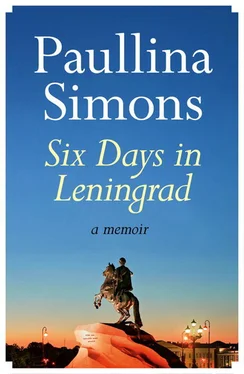Choked up, everyone drank. My mother stood and stormed outside.
When she came back she said to my sister, “Paullina doesn’t love me.”
“What are you talking about, Mama?” said Liza. “She is your daughter. What are you talking about? You’re crazy.” That’s my twenty-year-old sister.
When I was still in Texas, my grandparents kept saying on the phone how they couldn’t wait to talk to me about Russia. But when I got to New York, they didn’t talk to me about Russia at all.
I thought it was a product of too many people, too much food, too much to do, so one night, at Kevin’s suggestion, I left my family at the hotel and came at 10:30 in the evening to talk to my grandparents all by myself. My parents had gone out to the movies.
My grandmother didn’t get up from the armchair for two hours because she was too busy watching a Mexican soap opera translated into Russian. My grandfather — an engineer, a shipbuilder, a war hero, a chess player, a genius — was too embarrassed to watch in front of me so he made tea and we chatted idly about nothing, biding time until my grandmother got unglued from her Mexican soap opera. It was well after midnight when she came into the kitchen, and we looked over the copies of the photos from Leningrad and bickered about which ones they could have and why I couldn’t give them any of my negatives. I left at one. We had not spoken about Russia.
My father’s old friend Mark came to have dinner with us one night and while he ate he asked me what I thought of Russia. I shrugged. I said by way of reply, “Have you gone back?” He has been in America with his family since 1977. My father got him and his whole family out. They lived with us for months when they first arrived in New York. Shaking his head, with his mouth full of my father’s shrimp, Mark said, “I don’t want to go back. I’m not interested in seeing it. It hasn’t changed. I left because I didn’t want to live that life. Why should I go back and see it’s all the same?” He looked at me. “And I can see by your face, it is all the same, isn’t it, Paullina?”
One evening, not long before we returned to Texas, my mother was looking listlessly through copies of my photos and stumbled upon pictures of Radik and Lida. Holding a photo in her hand, she jumped up to run to my father, then sat back down and said, “Is this Lida? Paullina, do you know? Is this Lida?”
“Of course, I know,” I said. “It is Lida.”
“Oh my God,” my mother said. “She got so old. She got so old. Oh my God.”
Having finished his smoke, my father came back inside, and my mother shoved the picture of Lida into his face. “This is Lida, Yura?”
“Yes,” he said, taken aback by my mother’s fervor.
“Yura, do I look this old? Oh my God, do I look like this?”
He moved the picture further away from him, and stepped away from my mother. “No. Stop it, Alla, what are you talking about?”
My mother slumped down, defeated by Lida’s photo. “She was never very beautiful,” she said. “But this just shocks me. Shocks me.”
“Not beautiful like Radik?” I teased her.
“Oh,” she said. “Nobody was beautiful like Radik.”
“Of course not,” I smiled.
She looked at a photo of him. “He got old now, he’s lost some of his shine, still he’s not bad, right?”
“Right,”
My mother told me that when Papa and she had first met—
“During or after Dzhubga?”
My mother looked at me as if I were speaking Armenian. “After,” she said slowly. “But before we were married. And what do you know about Dzhubga, anyway?”
“I saw you,” I said. “Saw you being painted. You were so beautiful.”
“I was, wasn’t I?” She looked so sad when she said it.
“Tell me what Papa said about Radik, Mama.”
Sighing, she continued. “Your Papa, well, he was not your Papa yet, said, ‘I’ll introduce you to all my friends, but one of them, you will stop loving me, leave me and go with him, because he is just incredible.’” My mother had assured my father, that that would never happen, but when she saw Radik for the first time, she told me that her breath did stop.
My grandfather chimed in. “Radik,” he said, “was the most handsome man you ever saw. Men and women both thought so. You could not stop looking at him. You could not even if you wanted to.”
“Well, he is old now,” my grandmother said.
“He may be old, but Babushka, you didn’t see what I saw, the way our whole table at dinner at his house could not take their eyes off him,” I said.
Always a cynic, my grandmother snorted dismissively.
My father, embarrassed by these personal discussions of his friends, mumbled, “Ladies and gentlemen…” trailed off and left to smoke outside.
I was amused at the way 60-year-old people and older did not forgive the aging process in other 60-year-old people.
Particularly Radik.
Almost singularly Radik, I decided. As if, they all — Ellie, my mother, grandmother, grandfather were all happy in their secret souls that a star like Radik dulled, that old age did not spare him either. We were all beautiful, they seemed to say, we were all young and beautiful, and he most of all, but we got old, and he got old, too, thank God .
Once I had it figured out, I said, “Well, I didn’t know Radik when he was young—”
“Oh, you wouldn’t have been able to resist him,” interjected my grandfather.
I repeated, “I didn’t know him then, but I think that for a 60-year-old man, he still looked pretty good.”
My mother studied his picture again for a long time. “Not bad,” she finally said. “But not like before.”
Oh, the pitiless old age.
I shot sixteen rolls of film. 600 photos. To reflect on the events of six days, that’s a 100 pictures per day. Surely that was enough to show what I had seen, to show a small measure of what I had felt. But I found that the pictures subtracted from rather than enhanced my memories. Each photo, taken at an average speed of one-sixtieth of a second. The shutter was open for a total of ten seconds. Of those ten seconds, I have six hundred photos.
Ten seconds out of six days. They conveyed nothing, not the pain of Shepelevo, not the sadness of Fifth Soviet, not the crumbling stucco that I saw for hours and hours, not the marble halls of the Hermitage. And what about all those seconds, those minutes, those hours I didn’t take pictures of? What happened to them? I regretted not taking a photo of Ellie’s floors. I regretted not taking pictures of any of the toilets I visited or avoided. Why didn’t I take a photo of the outside of the Diorama Museum or of Mariinsky Bridge? Where was the mezzanine in the Grand Hotel Europe, where were my blini and caviar? Where were my memories? Where was the smell of Shepelevo? The smell of the metro? The smell of my old apartment’s toilet near the back door of the kitchen? Where did the six days go?
They sat right in my chest. They filled me from morning to night, and when we came back to Texas I was so glad I had my wood blinds and my Irish Cream colored walls and my satellite television service, so I didn’t have to close my eyes and think of Shepelevo, of my apartment, of the life that I would have continued to live just like many of the people I loved. No, let me swim in my pool instead to get my heart away from Leningrad.
Except I couldn’t look at my house either. No place for me there, and no place for me here.
Blink and you miss it. Forget. Regret. Salt in a little napkin that we pour on our tomatoes in Lake Ladoga as we sit on a plastic drop cloth, on grass and eat bologna and Russian bread. Where was a picture of that?
Читать дальше












